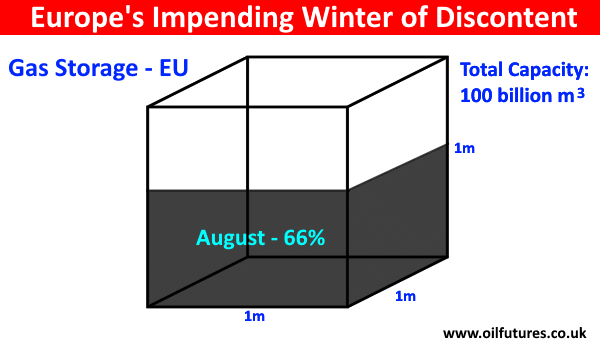source: Anadolu Data
The positive correlation between the prices of crude oil and LNG, liquified natural gas, has been continuing this week too, eclipsing the significance of the US crude oil stocks in the game of determining the current price of the commodity.
As of 13:00 GMT, the prices of WTI, Brent and LNG were at $85.88, $92.19 and $7.83 respectively.
At present, as far as the EU is concerned, 66% of its collective gas storage, 100 billion cubic meters, is full; the EU set a target of 80% by November for the member states, before Russia closed Nord 1 stream pipeline - citing the urgent repairs.
Understandably, not only are the members of the EU scrambling to fill the gaps in their storages, but also are trying to achieve the collective target agreed upon, in order to alleviate the anxieties of the public over the supply crisis in winter.
With the prices of oil and gas at record levels, the public discontent is simmering in the EU: there have been pockets of significant protests in some countries in the EU that can snowball into what German Chancellor often called, 'social unrest'; major European manufacturers, meanwhile, are seeking a lasting solution to the crisis rather than sticking plasters in the presence of slow economic growth.
The list of industries in Europe that bears the brunt of the energy crisis ranges from producers of toilet papers to largest steel makers in the continent.
In the UK, meanwhile, the production of natural gas has gone up by 26% during the first half of year 2022, compared to the same figure in 2021. The increase, which is said to be enough to supply 3.5 million homes with gas for a year, makes the UK less dependent on imported gas; since June 2022, the UK has completely stopped imports of oil, gas and coal from Russia.
In order to address the looming energy crisis, the EU members are turning to all available sources in the hope of reaching the 80% capacity by November. The calculations, however, were made with the assumption that Russian gas would flow through Nord Stream 1 pipeline without a hitch, which not turned out to be the case.
Russia has since shut down Nord Stream 1 citing the need of repairs; President Putin says if Europe has an urgent need of gas, they can have it through Nord Stream 2 that lies on the Baltic seabed; according to Mr Putin, it can deliver 4.7 billion cubic meters of gas in one month.
The only hope of averting a major crisis is pinning our hopes on mild winter in the northern hemisphere in the next few months; unfortunately, it is not something that can take for granted. Nobody forecast a scorching summer this year, yet it was one of the hottest on record.
No weather model can forecast the weather beyond a few days ahead; even they, more often than not, deviate considerably.
As the winter gas crisis shows no sing of abating, the financial pain suffered by customers at pumps is not going to go away soon. Although the price of crude oil almost fell by $10 in recent weeks, customers do not get a corresponding fall at pumps, when they fill up their tanks.
The US has been releasing its SPR, Strategic Petroleum Reserve, at a rate of 1 million bpd since March for a period of six months. There are reports that it may be extended till November, but at a much reduced rate in the hope of maintaining the equilibrium in the crude oil markets.
The CEO of Aramco, the Saudi oil giant, meanwhile, said in Switzerland on Tuesday that the lack of investment in the sector is the root cause for the current shortage in oil supply. This has been the position held by the Saudis in particular, OPEC+ in general, when coming under pressure to pump out more.
That means, the likelihood of a significant boost to the crude oil supply by the OPEC+ is not very encouraging. With the revival of the JCOP all but dead, the potential contribution from Iran is unrealistic.
In these circumstances, the price of crude oil will remain stubbornly high for the foreseeable future at the expense of global economic growth.









